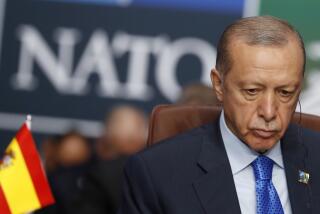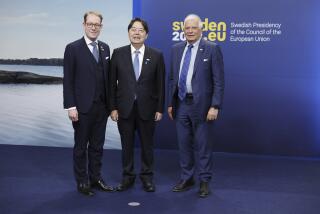PACIFIC PERSPECTIVE / JAPAN : Japan Should Join in a Wider Europe : The inclusion of Japan in the European security framework would enhance regional and global stability.
- Share via
TOKYO — The integration of the European Community, scheduled for 1992, carries with it the potential for producing a new political entity that will surpass the traditional framework of the nation-state.
Undoubtedly, this process of integration will further invigorate the Western European economy and contribute greatly to the development of the world economy. Further into the future, we can envision a more comprehensive political and economic consolidation of a wider Europe, if the reforms of the Eastern European countries and of the Soviet Union, as well as the integration of the European Community, go forward as planned.
If this dream of a greater Europe can be realized--and the possibility of economic and political disruption averted--it will signify not only the final dissolution of the Cold War division of East and West that began in Europe, but a new page in the history of Europe itself--and indeed of the world.
Japan, therefore, has a great interest in the current changes taking place in Europe, both politically and economically.
Needless to say, a stable political framework will have to be premised on the ability of Eastern Europe and the Soviet Union to achieve stable economic development.
Although Japan has taken steps to participate in the economic development of Europe--promising a $1.95 billion package of assistance to Poland and Hungary--it remains a political outsider.
Italian Foreign Minister Gianni de Michelis argued in a recent article: “I strongly favor finding a way to end Japan’s political isolation from Europe. Japan, excluded by the North Atlantic Treaty Organization 41 years ago, should be brought into the Helsinki conference. Everyone would benefit from this closer political association.”
I fully agree with him and believe the appropriate first step toward integrating Japan into a wider Europe would be allowing my country to participate as an observer in the Conference on Security and Cooperation in Europe. I hope this might be forthcoming in the months ahead, as Italy assumes leadership of the European Community.
The United States and Canada participate in the conference, although they are not European countries.
It is imperative that major changes in Europe foster peace and stability rather than confrontation and stagnation. The CSCE has provided the most appropriate international framework to help ensure this positive outcome. The conference incorporates a large number of participants, both ally and adversary, and has produced notable achievements, including the Helsinki Final Act. The unification of Germany will be finalized through the same process.
Today, the Conference on Security and Cooperation in Europe already plays an important role in providing for the peace in Europe, and therefore it has had an important influence throughout the world. In the future, if the conference process results in the establishment of a security system that brings together members of both NATO and the Warsaw Pact, this new European security system will serve as the central pillar of the post-Cold War global security system. Thus, it is possible that it will be seen as a model for other new forms of regional security that will gradually emerge around the globe.
The construction of a stable political framework that will ensure increasing confidence among nations will be extremely important to security in the post-Cold War era. During the Cold War, global security was based on deterrence. Of course, a host of dangers are present today that warrant the maintenance of a credible deterrent capability, despite the relaxation of East-West tensions.
China and other countries possess nuclear weapons, and as long as there is a danger of nuclear proliferation, the United States and the Soviet Union must continue to maintain a certain level of nuclear forces. However, war between the superpowers is now even less likely than in the past; now more than ever, the use of nuclear weapons is unthinkable.
With East-West relations in the midst of transformation, so too must the means of providing for our national security be transformed. We will have to move away from a security policy based chiefly on deterrence to one that relies on what I would call “deterrence plus stability.”
Japan has cooperated in the provision of global security as a member of the West, within the limits of its constitution. Since Japan clearly committed itself at the Williamsburg Summit in 1983 to the principle that the security of the West is indivisible, our position has been unequivocal. Therefore, insofar as the Conference on Security and Cooperation in Europe is of major significance to global security, it is inconceivable that Japan not engage itself, directly or indirectly, in that process.
More to Read
Sign up for Essential California
The most important California stories and recommendations in your inbox every morning.
You may occasionally receive promotional content from the Los Angeles Times.













